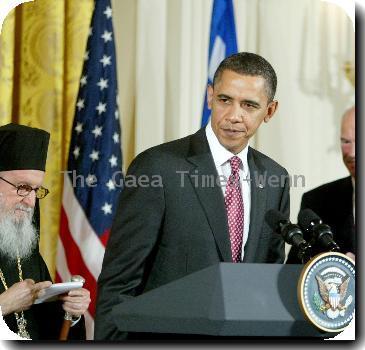Geithner’s visit to Beijing will help lead China to let its currency rise, experts say
By Martin Crutsinger, APThursday, April 8, 2010
Geithner China visit likely to spur currency shift
WASHINGTON — Treasury Secretary Timothy Geithner’s surprise visit Thursday to China yielded no immediate change in China’s currency policy. But analysts predicted the Obama administration’s efforts to mend frayed relations will result in a currency change, possibly within weeks.
A move to let the yuan rise in value against the dollar would benefit U.S. exporters. The undervalued Chinese currency has made Chinese goods cheaper for American consumers. But it’s hurt U.S. companies by making their products costlier in China.
Analysts cautioned, though, that any appreciation of the yuan will likely be gradual. They suggested that a rise in the yuan’s value would be limited to 3 percent to 5 percent annually. That would be similar to the process China adopted in 2005, only to halt in 2008 as the global economic crisis deepened.
Geithner met for about 75 minutes Thursday in the VIP lounge of the Beijing airport with Vice Premier Wang Qishan, China’s top economic official.
“The two sides exchanged views on U.S.-China economic relations, the global economic situation and issues relating to the upcoming economic track dialogue,” the Treasury Department said in a statement afterward.
Neither side acknowledged that currencies had been discussed. But analysts noted that Geithner was accompanied by David Dollar, Treasury’s economic and financial emissary based in Beijing and a key administration official involved in the currency issue.
Treasury had announced only on Wednesday that Geithner would make a previously unscheduled stop Thursday in Beijing after a two-day trip to India.
Analysts saw the discussions as part of an elaborate diplomatic dance. Both countries are trying to cool tensions that had flared over U.S. arms sales to Taiwan and a meeting between President Barack Obama and the Dalai Lama.
To help mend relations, Obama spoke for an hour with Chinese President Hu Jintao on April 1. And the Chinese announced that Hu would attend a Washington nuclear conference set for next week.
On Saturday, Geithner had announced he was postponing until summer the release of a report on whether China should be branded a currency manipulator.
All the moves were seen as efforts by the two nations to improve ties. Analysts viewed the postponement of the currency report as particularly important to the U.S. drive to persuade China to let its currency rise in value. The report’s postponement will let Beijing act without the threat of being targeted in a report required by Congress.
“The guillotine has been removed from the scene,” said Nicholas Lardy, a China expert at the Peterson Institute for International Economics, a Washington think tank. “Now, they will feel more comfortable in moving.”
Nariman Behravesh, chief economist at IHS Global Insight, agreed that delaying the currency report was critical to getting China to act.
“It would have been a lose-lose if we had called China a currency manipulator and that prompted them to come back and do things that would not be in our best interests,” he said.
China is the largest holder of U.S. Treasury securities. That fact has become even more crucial as annual U.S. budget deficits have topped $1 trillion.
“What this meeting was all about was trying to head off a confrontation with China,” Behravesh said. “This softer approach is more likely to yield results.”
Mark Zandi, chief economist at Moody’s Analytics, predicts China will start letting the yuan rise in value at some point in the current quarter.
Behravesh said he thought the move would occur sometime this summer.
Lardy said, “All the signals are that they will move sometime in the next few weeks.”
American manufacturers contend China’s currency is undervalued by up to 40 percent. They argue that America’s trade deficit with China, the largest with any country, has cost millions of U.S. manufacturing jobs. That claim has struck a chord in Congress as the nation emerges from a recession that wiped out more than 8 million jobs.
China’s toughest critics in Congress said they weren’t sure the administration’s softer tone would achieve the desired results.
Sen. Charles Schumer, D-N.Y., and seven other senators have introduced legislation to make it easier to impose tough trade sanctions on China if it doesn’t let its currency rise. Schumer said Thursday he was “dubious” that China would do any more than make “small, halting and temporary” steps.
Sen. Arlen Specter, D-Pa. and another sponsor of the legislation, was critical of the administration’s change in tone.
“We’re likely to get more out of the Chinese by being tough than by being complacent,” Specter, who is in a tough re-election campaign, said in an interview.
“It’s time the Chinese were honest about currency and let it float. … They’re taking our jobs. They’re taking our money, they’re lending it back to us and they’re owning half of America. … China is guilty of international banditry.”
Beijing has publicly pushed back against the U.S. pressure. The Chinese commerce minister has warned that a rise in the yuan’s value would hurt exporters, who provide sizable employment. A debate has been raging among senior Chinese officials and economists about whether to stand firm or let the yuan appreciate.
Some economists argue that a decision by Beijing to allow the yuan to rise would ease strains in China’s economy, including inflation pressures.
Beijing tied the yuan to the dollar for decades. It broke that link in 2005 and allowed it to rise about 20 percent through late 2008. The government halted its rise after the international financial crisis hit and has held its currency steady against the dollar to help its exporters compete as a plunge in global demand wiped out millions of Chinese factory jobs.
Olesen reported from Beijing. AP writers Elaine Kurtenbach in Shanghai and Foster Klug in Washington contributed to this report.
Tags: Asia, Barack Obama, Beijing, China, East Asia, Greater China, Hu Jintao, North America, United States, Washington

